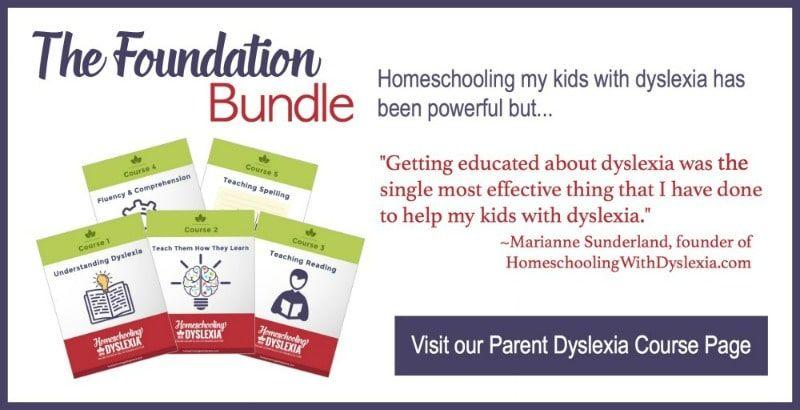One of the most important things is to remember as the parent or teacher of kids with dyslexia is to focus on identifying and building strengths. That is why we are sharing some of the little-known strengths of dyslexia.
What is Dyslexia?
In case you’re new around here and don’t know yet, dyslexia is a genetic difference in the wiring of the brain. It causes those whose brains are wired thus to struggle mightily with the written word – this in complete contradiction to the average to above average intelligence that they possess.
Defined by Weakness
Up until very recently, dyslexia has been defined, detected and diagnosed primarily based on the weaknesses associated with dyslexia. Namely, poor reading, writing and spelling ability despite being of average to above-average intelligence. Dyslexia has been called a ‘hidden disability’ because it isn’t obvious except in the school setting.
Many would go further to say that, although dyslexia appears as a disability in certain circumstances, it is actually just a learning difference.
The way that the dyslexic brain works is not bad, it isn’t wrong, and it isn’t deficient. It’s just different. And the difference is not a disability. In fact, the differences in a dyslexic brain bring with it many advantages that go unrecognized and are often mislabeled and even maligned. – graphic designer Madalyne Hymas
Dyslexic Strengths
Interestingly, researchers Brock and Fernette Eide have taken the time to study brain function and structure as well as real people with dyslexia with some profound findings.
These different wiring patterns in the dyslexic brain that cause so much trouble with 2 dimensional learning, also result in some pretty powerful 3 dimensional strengths – a structural trade off, if you will.
People with dyslexia are known for their lack of fine detail strengths – the strengths that result in accurate and precise reading and spelling.
On the flip side, the wiring of the dyslexic brain results in global big picture strengths such as strengths in comprehension, word associations, context and gist.

M-I-N-D Strengths
The Eides have documented 4 fascinating areas of strength that people with dyslexia possess. These are explained in their book, The Dyslexic Advantage, as follows:
M-strengths: Material or Mechanical Reasoning
M-strengths are described as an ability to reason about the 3-dimensional properties of the physical or material world – the shape, size, motion, position, spatial orientation and interaction of physical object.
This is the ability to think and reason in 3D People with these strengths are excellent at conceptualizing objects or systems and manipulating them in their minds. For example, the land developer who has the ability to see land and envision a building complete with landscaping that could be there – all in the mind.
I-strengths: Interconnected Reasoning
I-strengths are described as an ability to spot connections or relationships between different objects, concepts, or points of view.
This is the ability to make connections between things, see relationships, patterns, and view ideas or objects from different perspectives. People with I-strengths are known for making connections between or across different fields and for having very flexible minds.
Consider this example from the Dyslexic Advantage web site:
“I asked my 11 year old dyslexic son what do you think of when I say the word cat. After about 5 seconds I said, “I think of a fuzzy kitten.” Eventually he said, “Well first I wondered are you talking about someone named Cat or are you talking about a tiger or a lion or maybe you mean a mama cat with her kittens or maybe a cute little kitty or maybe you mean a cat walk up in the sky. This is what he thought of in 5 seconds! while I thought of a fuzzy kitten before I interrupted his train of thought.
What an eye-opening scene this is! People with dyslexia, who are often thought of as being slow, aren’t’ slow at all. They are just thinking of so many things – while we with our simple minds are thinking of one simple thing.
And this quote:
“I always had trouble with multiple choice questions in college because I’d think of so many different ways to interpret questions.” – Tech venture capitalist
This is perhaps where the idea of dyslexics being more creative comes into play. In one study, dyslexic subjects came up with 30% more possibilities on an alternative use task (i.e. asking subjects to name some alternative uses for a brick).
N-strengths: Narrative reasoning or ability
N-strengths are described as an ability to create stories by connecting a series of mental scenes from past personal experience, as well as the tendency to use stories to recall the past, understand the present, and imagine the future.
This is the ability to tell an amazing story and be able to imagine different scenarios. People with narrative strengths tend to think in stories. This is also called episodic memory. This strength in personal episodic memory results in weak rote memory – a memory paradox.
As the mom and teacher of many kids with dyslexia, I find this knowledge eye-opening because in the school setting, we are often asking our kids to focus on tasks that require rote memory. Check out this chart for more insights.
D-strengths: dynamic reasoning skills
People with D-strengths have the ability to recombine elements of past experience and use this information to predict or mentally simulate future outcomes with great accuracy.
People with dynamic reasoning strengths have great ability to project into the future and make predictions about the future based on their previous experiences.
Consider this quote from Gerry Wittenberg, CEO of Party City:
“I spend most of my time in business thinking, “What’s next?” I see it. I see it in my mind and I start working towards it. “
It’s easy to see how a person with dynamic reasoning strengths would also have strong entrepreneurial skills. Research has shown that, although dyslexia makes up about 20% of the population, about 40% of entrepreneurs are dyslexic.
Focus on Strengths
One of the most important things is to remember as the parent or teacher of kids with dyslexia is to focus on identifying and building strengths. Too often all the focus is on “fixing what’s wrong” rather than celebrating and nurturing what’s right.
Dyslexic brains are organized in a way that maximizes strength in making big picture connections at the expense of weaknesses in processing fine details.
Most of what is done in the classroom in the early grades focuses on acquiring the kind of rote skills that are dependent on perceiving visual or auditory things very clearly as well as learning skills automatically to the point where you don’t have to think about them. These are just the kinds of rote and fine detail skills that dyslexic kids tend to have difficulty learning. But because that’s where the focus is in the early grades, their strengths in big-picture processing or remembering personal experiences tend to get overlooked.
While dyslexic children may struggle in the early grades, they often grow into gifted story tellers, inventors and entrepreneurs.









Under “N”. It says, ” check out this chart for more insights.” Is there a link to the chart?
🙂 (:
🙁 ):
I was wondering the same thing!
I recognise so many of the MIND strengths in my son. It has been a long journey from primary school to college. After initially being told by a primary teacher the reason for his poor performance was due to a low IQ. Quite laughable when I think of all he has achieved to date and what’s more all he WILL achieve in the future. My son is due to study Physics at university (how about that for a lack of intelligence!). My message to any parents struggling is – read up on dyslexia, get the person assessed by an educational psychologist and follow their recommendations within the school setting and most importantly BELIEVE in them because if you don’t believe in them – who will? Celebrate their strengths.
Wonderful story Alison! Thank you for sharing. 🙂
Being a teacher taking a graduate course on dyslexia, thus why I am reading this article, I thought it’s too bad the teacher is blamed for trying to figure out how to best help a student. Teachers are not experts on every disability there is because it’s widely not taught in college programs. It becomes a learn on the job and guess and check situation when students come to us and present different difficulties. I am certified in elementary and special education and have been teaching for 25 years, but I am spending a great deal of my own time to find out more about dyslexia because I suspect a student may have it, but it will be a long road to then try to convince the school to give her the services I think she needs and deserves. So if one teacher in your child’s past suspected lower intelligence, I say thank that teacher. At least he/she was paying enough attention to your child to try to figure out what was going on educationally to him/her.
Teachers aren’t expected to know about every little learning type or disorder. However, if a teacher finds a child struggling, the thing to do is notify the parents and suggest they seek an expert option or testing, not label the kid with a low IQ, which is the same as calling them stupid. Additionally, even though dyslexia is labeled in the DSM as a disorder, it is far from it. Dyslexia is a type of brain power allocation, or aptitude. With all aptitudes, it has as many strength as weaknesses balancing our brains output.
Mark,
Are you a teacher? Have you ever had to call a parent into your classroom and tell them that their child is struggling? Unfortunately not all parents want to hear that. It is a difficult thing to do. I will agree that the teacher may have made a false statement. But, you are taking information from just one person, you haven’t hear the other side of the story. You do not know what the background is. I am more than excited for the child to be excelling in life, but do not be so quick to judge others.
Kimberly,
I couldn’t agree with you more. I too have taught for 20 years and I have never been given any training on any learning disabilities. When children come to me and they are struggling I instantly start researching the behaviors in hopes of finding something that will help. It is so sad to me how this one teacher leaves this ever lasting brand on the rest of us. I wish that these parents could spend just one week in our shoes, perhaps then they would understand why some teachers are jaded, tired, frustrated, and angry. But, for those of you out there, not all teachers are like that. Even after 20 years, I love teaching, it is my calling and I do it to help not to collect a paycheck. But, I’m not always right, so forgive me if I make a mistake.
My daughter’s teacher was able to strongly suggest that as a parent I should request getting my daughter tested for dyslexia and dysgraphia. I was very open-minded and knew that my child was struggling. But she emphasized that I needed to request it as the parent and then wrote a letter of what she observed in class once I had. It is a tough situation to be in as a teacher and a parent, as a teacher you see the child’s struggles and want to do what is best for them, but are often hindered by the administrative or paperwork reasons. As a parent you may not have the opportunity to see the same things that occur in school or sometimes don’t want to see accept what you do see.
My parents really didn’t like my 3rd-grade teacher because she was so rude. However, they both give her credit for me finally being evaluated and being able to obtain services through an IEP. She basically told my parents there was something wrong with me and she didn’t have time to deal with me and said I shouldn’t be in her class and needed to be evaluated. Little did she know that my parents had been trying to get the school district to conduct an evaluation for the last 2 years, but were continually denied because I was “barely passing school standards”. They even tried to talk my parents into allowing me to skip state testing because my test scores were so low, but my parents didn’t fall for that. Anyway, it took my 3rd-grade teacher marching into the office and demanding that I be evaluated because she didn’t want to have to deal with me. I was finally diagnosed with dyslexia that year and was able to start receiving services. She definitely could have approached my parents in a completely different way and treated me in a more supportive/concerned way rather than laying all that negativity on me.
Such great information. The question for a mom to all of this, though, is how? I can see many of these characteristics in my 10 yr old dyslexic son, but I have no idea how to go about nurturing them!
It starts by observing them and allowing them to be used in daily life as much as possible. Then looking for ways for them to branch out into their interests as they get older.
As a 54 yr old woman with scotopic sensitivity and having a son with dyslexia I can tell you if I’d have had any kind of help at school age I’d have been so much more confident in most selects of my life. My son has excelled in so much but not being able to get a diagnosis until he was in senior school held him back. He’s 27 now At junior level the teachers had him on a programme called beating dyslexia but said he’s not dyslexic he’s just lazy! Lucky I didn’t take that further at the time.
He’s now a brilliant mechanic, can play guitar exceptionally well and does not let his ability to comprehend get to him because of the strategies he’s learned. In fact just as this article explains his all rounder skills are amazing. He would help anyone too. I’m so proud of him.
My daughter is 6 yrs you get and just picks things up just like that. She’s at uni and doing well. I work with people who have difficulties learning and always have. It’s amazing to see youngster fly in their way. But we have to be insightive if that was a word.. lots of luck and love to all
Thanks for sharing your story, Lou. I love it!
I’m a special educator of 27 yrs. We are not experts in every area and as I have more students with the diagnosis of dyslexia I needed to educate myself. I believe in the power of the educational team (including parents and students) and knowing who and how to access the experts as needed!